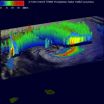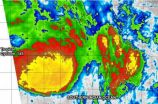(Press-News.org) How you represent yourself in the virtual world of video games may affect how you behave toward others in the real world, according to new research published in Psychological Science, a journal of the Association for Psychological Science.
"Our results indicate that just five minutes of role-play in virtual environments as either a hero or villain can easily cause people to reward or punish anonymous strangers," says lead researcher Gunwoo Yoon of the University of Illinois at Urbana-Champaign.
As Yoon and co-author Patrick Vargas note, virtual environments afford people the opportunity to take on identities and experience circumstances that they otherwise can't in real life, providing "a vehicle for observation, imitation, and modeling."
They wondered whether these virtual experiences — specifically, the experiences of taking on heroic or villainous avatars — might carry over into everyday behavior.
The researchers recruited 194 undergraduates to participate in two supposedly unrelated studies. The participants were randomly assigned to play as Superman (a heroic avatar), Voldemort (a villainous avatar), or a circle (a neutral avatar). They played a game for 5 minutes in which they, as their avatars, were tasked with fighting enemies. Then, in a presumably unrelated study, they participated in a blind taste test. They were asked to taste and then give either chocolate or chili sauce to a future participant. They were told to pour the chosen food item into a plastic dish and that the future participant would consume all of the food provided.
The results were revealing: Participants who played as Superman poured, on average, nearly twice as much chocolate as chili sauce for the "future participant." And they poured significantly more chocolate than those who played as either of the other avatars.
Participants who played as Voldemort, on the other hand, poured out nearly twice as much of the spicy chili sauce than they did chocolate, and they poured significantly more chili sauce compared to the other participants.
A second experiment with 125 undergraduates confirmed these findings and showed that actually playing as an avatar yielded stronger effects on subsequent behavior than just watching someone else play as the avatar.
Interestingly, the degree to which participants actually identified with their avatar didn't seem to play a role:
"These behaviors occur despite modest, equivalent levels of self-reported identification with heroic and villainous avatars, alike," Yoon and Vargas note. "People are prone to be unaware of the influence of their virtual representations on their behavioral responses."
The researchers hypothesize that that arousal, the degree to which participants are 'keyed into' the game, might be an important factor driving the behavioral effects they observed.
The findings, though preliminary, may have implications for social behavior, the researchers argue:
"In virtual environments, people can freely choose avatars that allow them to opt into or opt out of a certain entity, group, or situation," says Yoon. "Consumers and practitioners should remember that powerful imitative effects can occur when people put on virtual masks."
INFORMATION:
For more information about this study, please contact: Gunwoo Yoon at gyoon3@illinois.edu.
The original research article can be found online: http://pss.sagepub.com/content/early/2014/02/05/0956797613519271.full
The APS journal Psychological Science is the highest ranked empirical journal in psychology. For a copy of the article "Know Thy Avatar The Unintended Effect of Virtual-Self Representation on Behavior" and access to other Psychological Science research findings, please contact Anna Mikulak at 202-293-9300 or amikulak@psychologicalscience.org.
Virtual avatars may impact real-world behavior
2014-02-10
ELSE PRESS RELEASES FROM THIS DATE:
Huntington disease prevention trial shows creatine safe, suggests slowing of progression
2014-02-08
The first clinical trial of a drug intended to delay the onset of symptoms of Huntington disease (HD) reveals that high-dose treatment with the nutritional supplement creatine was safe and well tolerated by most study participants. In addition, neuroimaging showed a treatment-associated slowing of regional brain atrophy, evidence that creatine might slow the progression of presymptomatic HD. The Massachusetts General Hospital (MGH) study also utilized a novel design that allowed participants – all of whom were at genetic risk for the neurodegenerative disorder – to enroll ...
Stroke trigger more deadly for African-Americans
2014-02-08
ANN ARBOR, Mich. — Infection is a stronger trigger of stroke death in African- Americans than in whites, a University of Michigan study shows.
African-Americans were 39 times more likely to die of a stroke if they were exposed to an infection in the previous month when compared to other time periods while whites were four times more likely and Hispanics were five times more likely to die of stroke after an infection, according to the findings that appear online Feb. 7 in Neurology.
The most frequent infections were urinary, skin, and respiratory tract infections ...
Women fare worse than men following stroke
2014-02-08
WINSTON-SALEM, N.C. – Feb. 7, 2014 – The good news: More people survive stroke now than 10 years ago due to improved treatment and prevention.
The bad news: Women who survive stroke have a worse quality of life than men, according to a study published in the Feb. 7 online issue of the journal Neurology.
Researchers at Wake Forest Baptist Medical Center compared the quality of life in men and women who had a stroke or transient ischemic attack (TIA). A total of 1,370 patients ages 56 to 77 from the AVAIL registry – a national, multicenter, longitudinal registry of ischemic ...
New application of physics tools used in biology
2014-02-08
A Lawrence Livermore National Laboratory physicist and his colleagues have found a new application for the tools and mathematics typically used in physics to help solve problems in biology.
Specifically, the team used statistical mechanics and mathematical modeling to shed light on something known as epigenetic memory -- how an organism can create a biological memory of some variable condition, such as quality of nutrition or temperature.
"The work highlights the interdisciplinary nature of modern molecular biology, in particular, how the tools and models from mathematics ...
Social or stinky? New study reveals how animal defenses evolve
2014-02-08
When people see a skunk, the reaction usually is "Eww," but when they see a group of meerkats peering around, they often think "Aww."
Why some animals use noxious scents while others live in social groups to defend themselves against predators is the question that biologists Tim Caro of the University of California, Davis and Theodore Stankowich of California State University, Long Beach and sought to answer through a comprehensive analysis of predator-prey interactions among carnivorous mammals and birds of prey.
Their findings appear in the online edition of the ...
Endocrine Society calls for large-scale studies to evaluate testosterone therapy risks
2014-02-08
Chevy Chase, MD—According to a statement issued today by the Endocrine Society, the risks and benefits of testosterone therapy for older men with declining levels of the hormone need to be fully evaluated.
The statement comes in response to recent studies that have raised concerns about the safety of testosterone therapy in older men with a history of heart disease. Two retrospective analyses and one randomized trial supported by the Veterans Health Care System, and the National Institutes of Health found a higher rate of cardiovascular events in men who received testosterone ...
NASA spots very heavy rainfall rates in Tropical Cyclone Edilson
2014-02-08
Imagine receiving as much as 7 inches of rain in one hour. That's about what NASA's TRMM satellite spotted falling in one area within Tropical Cyclone Edilson as it moved over the Southern Indian Ocean.
The Tropical Rainfall Measuring Mission or TRMM satellite is managed by both NASA and the Japan Aerospace Exploration Agency called JAXA. TRMM can read the rate in which rain is falling on Earth while in its orbit high above.
The TRMM satellite had an excellent early morning look at Edilson on February 7, 2014 at 0237 UTC/06:28 local time when it passed directly above ...
Diaphragm pacing in spinal cord injury successful in weaning patients from ventilators
2014-02-08
CLEVELAND – A new study published in the Journal of Trauma and Acute Care Surgery finds that diaphragm pacing (DP) stimulation in spinal cord-injured patients is successful not only in weaning patients from mechanical ventilators but also in bridging patients to independent respiration, where they could breathe on their own without the aid of a ventilator or stimulation.
The stimulation is provided by the Diaphragm Pacing System (DPS), a technology providing electrical stimulation to nerves running through the diaphragm, the major muscle involved in breathing. When stimulated, ...
NASA spots fourteenth tropical cyclone of Southern Indian Ocean season
2014-02-08
The fourteenth tropical cyclone of the Southern Indian Ocean season was born as NASA's Terra satellite passed overhead.
On February 7 at 0900 UTC/4 a.m. EST, Tropical Cyclone 14S had maximum sustained winds near 35 knots/40 mph/62 kph. It was located about 814 nautical miles/936.7 miles/1,508 km east-northeast of Port Louis, Mauritius near 14.8 south and 70.4 east. At that time, 14S was moving to the south near 8 knots/9.2 mph/14.8 kph.
The Joint Typhoon Warning Center noted that multispectral satellite imagery showed that the low-level center is exposed to outside ...
Thinking skills take biggest hit from anxiety in midlife women with HIV
2014-02-08
CLEVELAND, Ohio (Friday, February 7, 2014)—Hot flashes, depression, and most of all, anxiety, affect the thinking skills of midlife women with HIV, so screening for and treating their anxiety may be especially important in helping them function, according to a study just published online in Menopause, the journal of The North American Menopause Society (NAMS). The reproductive stage, whether it was premenopause, perimenopause or postmenopause, did not seem to be related to these women's thinking skills.
The conclusions come from a new analysis of data on 708 HIV-infected ...



